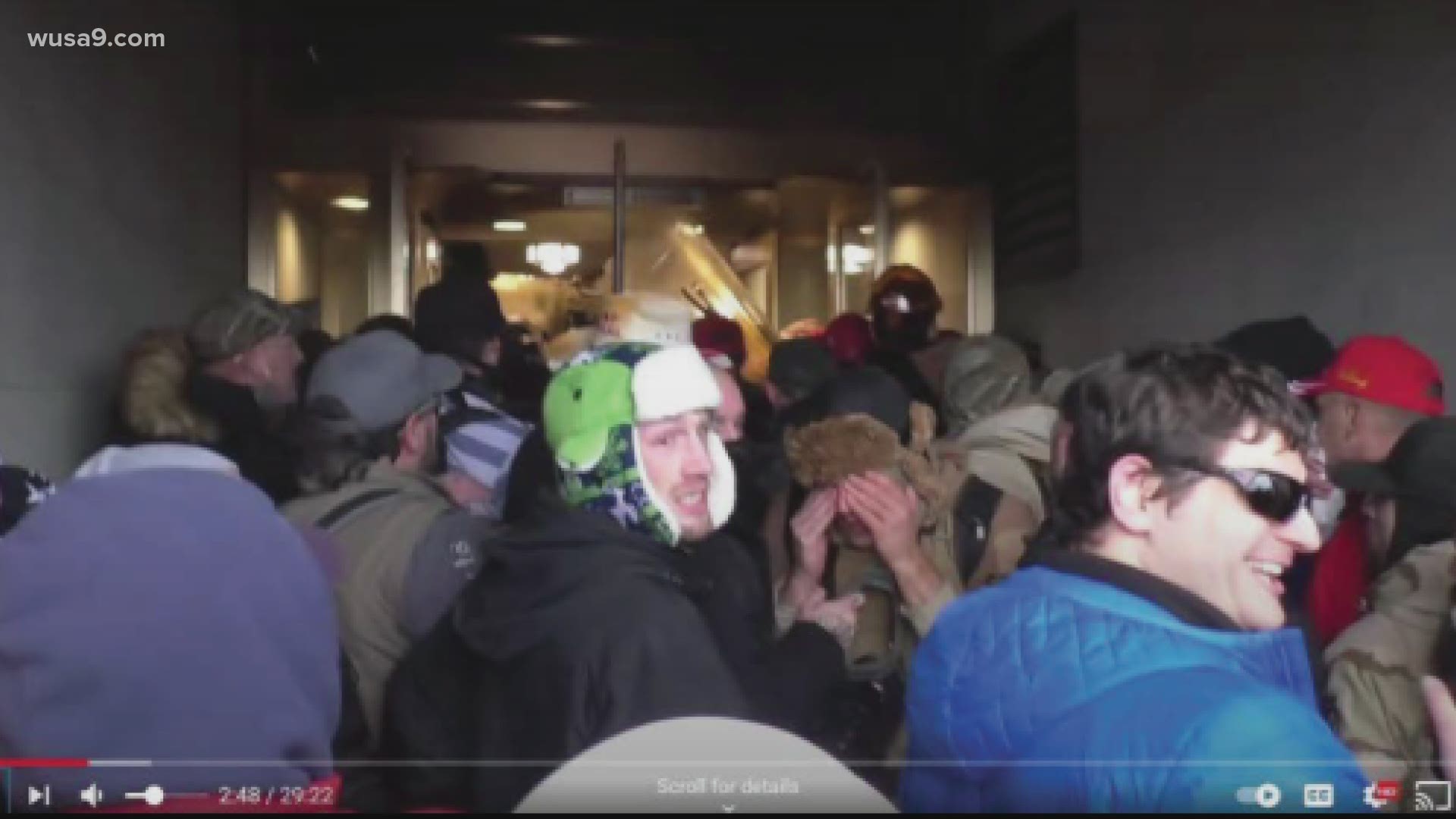WASHINGTON — A federal prosecutor grilled a Jan. 6 defendant on the witness stand for hours Monday – suggesting his claims that his former attorneys didn’t properly prepare him for trial were nothing more than an attempt at a “do-over” following his conviction.
Vitali GossJankowski, 34, took the stand Monday in an attempt to convince U.S. District Judge Paul Friedman to grant him a new trial on multiple charges connected to the Capitol riot. GossJankowski, a former defensive lineman for Gallaudet University’s football team who was enrolled as a student on Jan. 6, 2021, was convicted by a jury last year of felony counts of assaulting police, civil disorder, obstruction of an official proceeding and multiple misdemeanors for his role in the riot.
During his trial, GossJankowski told Friedman he understood he had a right to testify and that he’d decided not to. Shortly after his conviction, however, GossJankowski claimed he actually had wanted to testify – and his attorneys had failed to prepare him to do so.
Both of GossJankowski’s trial attorneys, assistant federal public defenders Edward Smock and Celia Goetzl, testified at a hearing last month that they’d counseled GossJankowski against testifying – saying, among other things, they were worried a jury would not find him credible – but that if he’d decided not to take their advice they would have done everything possible to prepare him to take the stand. Goetzl said they were concerned specific parts of his testimony could “actively hurt his case,” particularly if he claimed he did not know how to turn off a stun device he can been seen holding up toward police and, prosecutors argue, thrusting toward a downed officer.
Under questioning from his new attorney, Matthew Peed, GossJankowski said Monday he had wanted to take the stand because he believed he could “make more clear the events of that day.” Among the things he wanted to tell jurors was that he was trying to help the downed officer, not harm him. But, he said, his attorneys felt if he took the stand he would go “off-point” and could potentially increase his prison time if convicted.
“I felt forced to accept their plan,” GossJankowski said.
GossJankowski, who is deaf, communicated his testimony through professional American Sign Language interpreters.
During cross-examination from prosecutors, however, GossJankowski offered testimony that at times contradicted itself. At first, he said he had been truthful when, under oath, he’d told Friedman he didn’t want to testify.
“When you told the judge you understood that your lawyers could give you their best advice but it was your decision [whether to testify], you were telling the truth, right?” Assistant U.S. Attorney Francesco Valentini asked.
“Yes,” GossJankowski replied.
“That was my decision not to testify and I did tell the judge that,” GossJankowski said at another point.
Eventually, however, GossJankowski said he had “misled” the court when he told Friedman during his trial that he’d had enough time to prepare with his attorneys.
“I didn’t tell him the truth that day,” GossJankowski said. “I was just going along with what my attorneys said.”
GossJankowski then clarified he “believed at the time” he was telling the truth. Valentini then pressed him on when he changed his mind.
“It’s only after you were found guilty that you thought maybe you didn’t have enough time?” Valentini asked.
“Correct,” GossJankowski said.
“It was only after the jury found you guilty of assaulting [U.S. Capitol Police] Officer [Morris] Moore that you started telling the court that you were not happy with your attorneys?” Valentini asked.
“Yes,” GossJankowski said.
A request for a new trial is a standard post-conviction motion in federal court – and one that is rarely granted. Defendants claiming ineffective assistance of counsel must meet a high bar, showing both that their lawyer’s conduct fell below an “objective standard of reasonableness” and a reasonable probability that, but for their lawyer’s errors, the outcome of the trial would have been different.
Addressing the second factor, Valentini spent much of the hearing working to prove Smock and Goetzl’s concerns about GossJankowski’s potential testimony correct. Within minutes of beginning cross-examination, GossJankowski admitted he had wagged his finger and spat multiple times at officers who were defending the Lower West Terrace Tunnel because he was upset at them. He initially claimed it was to try to stop them from pepper spraying him – which he later acknowledged didn’t make sense. GossJankowski also claimed that when he can be seen in video lunging forward toward an officer, he was attempting to push off the officer’s riot shield to get away from the tunnel, not to get past the police line.
GossJankowski also acknowledged he can be seen smiling near the entrance of the tunnel when another rioter handed him a stun gun device but said when held it up toward police and activated it he was just “playing” with it. GossJankowski was ultimately acquitted by the jury of the more serious charge of assaulting police with a dangerous weapon, but convicted of a lesser felony of assaulting, resisting or impeding officers, even without his testimony.
Because GossJankowski’s testimony took nearly the entire day, the evidentiary hearing will continue to a third date when both the government and Peed will present final arguments on his ineffective assistance of counsel claim. If Friedman denies his motion for a new trial, GossJankowski will then proceed to sentencing.
GossJankowski was initially allowed to remain free following his conviction, but was ordered into the custody of the D.C. Jail in October after federal prosecutors brought intimidating and harassing messages he'd sent to law enforcement to the court's attention, including messages referring to FBI agents in antisemitic and homophobic terms. More than a half dozen U.S. Marshals, FBI agents and court security officers had to forcibly take GossJankowski into custody in the courtroom after he refused to surrender. Valentini said Monday the decision hadn’t yet been made about whether to pursue additional charges against GossJankowski related to the scuffle.

